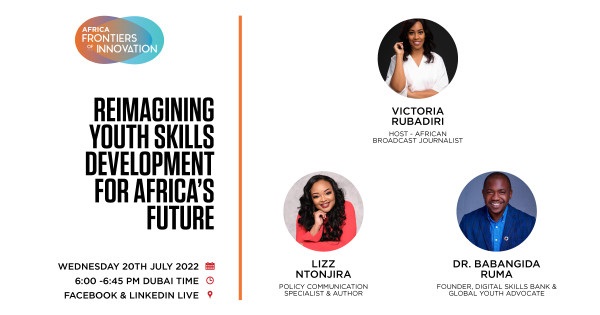Africa has the youngest population in the world, with almost 60% of people younger than 25. With high levels of unemployment and limited educational opportunities, how will these youth acquire the skills required to become powerful agents of change and the continent’s greatest asset? Transforming youth’s skills was the focus of the most recent Canon Africa Frontiers of Innovation.
Africa has the youngest, fastest-growing population in the world, with over 400 million people aged 15 to 35 years. Youth have the potential to be Africa’s greatest asset if they can acquire the skills required to make a meaningful contribution.
At the most recent edition of the Africa Frontiers of Innovation, presented by global imaging leader Canon (https://en.Canon-CNA.com/) Kenyan author of #YouthCan, Lizz Ntonjira and Nigerian youth advocate Dr Babangida Ruma joined moderator and broadcaster Victoria Rubadiri to unpack youth skills development in the region.
The award-winning Africa Frontiers of Innovation series aims to inspire creative solutions to contemporary challenges on the continent. “In the light of the recent UN World Youth Skills Day, we wanted to reimagine the future for Africa’s next generation,” said Mai Youssef, Corporate Communications Director at Canon.
Unemployment is one of the greatest challenges facing young people. According to the World Bank (https://bit.ly/3RzAxM2) North Africa and the Middle East are the regions with the highest youth unemployment. Further south, youth unemployment stood at 64 per cent (http://www.statista.com/) in South Africa in 2021.
COVID-19 has worsened the situation, disrupting education and training programs. It also caused enormous job losses which hit youth the hardest, according to the International Labour Organization (ILO). Unemployment exacerbates the existing skills gap. “Without work, skills development opportunities are limited. The importance of finding ways to give young people work experience cannot be overstated,” stressed Rubadiri.
The digital divide is another factor; youth in communities with limited technology are being left behind. “For Africa to participate successfully in the fourth industrial revolution, our youth need digital skills and infrastructure,” said Dr Ruma. Despite the challenges, there are several viable options for youth to develop skills, including mentorship, public-private partnerships and leveraging available resources, including free training and awards programs.
Firstly, there was a resounding call to update education across the continent. “Some curricula are 30 years old, but jobs have evolved. We need to start nurturing these in-demand skills from a young age,” said Ntonjira. “Learners are led to believe if they study hard, they will get a good job when they leave school or university. Then, when they graduate and can’t find a job, they are told to become an entrepreneur, but they have not been taught any business skills.”
Mentoring is something Ntonjira is passionate about. She founded the Lizz Ntonjira Network (https://LizzNtonjiraNetwork.com/) to inspire youth and create more opportunities. “Apprenticeship and mentorship don’t happen enough on the African context.” Ntonjira challenged the business community to find ways to integrate young people and applauded the Canon Student Development Programme (https://bit.ly/3RDT3CS) which every year connects 100 aspiring image-makers – from Africa, the Middle East and Europe – with imaging industry leaders.
She advises mentees to be forthright. “Be proactive, seek out suitable mentors, learn from them and build connections.”
Public-private partnerships are effective. Canon’s Miraisha program is a good example; to date, it has trained more than 5,850 participants from poorly resourced communities in Kenya, Uganda, Nigeria, Ghana and the Ivory Coast, with practical, marketable imaging skills.
Hundreds of Miraisha graduates have secured jobs or paid commissions. Some have started their own businesses. Over 250 have received awards or industry recognition and 20 graduates are now employed by Canon as trainers. “Africa’s youth can play a key role in building businesses, creating jobs, providing value, and innovating – things which Africa desperately needs,” said Youssef. “Miraisha gives them the skills, resources and support to leverage the power of imaging and see their ideas come to life.”
It is one of many free or low-cost training opportunities. “Google provides quality digital skills training online for free,” said Dr Ruma, who founded the Digital Skills Bank to bridge the gap between job seekers and job providers. “Once completed, there are millions of opportunities out there for digital-savvy Africans.”
Ntonjira agrees, “Many people have achieved a lot with very little, simply using social media to create their own brands and content.” Overall, the importance was for young people to be proactive. “Do not be afraid to fail, it’s a learning lesson,” explained Ntonjira.
Canon remains deeply committed to developing young people in Africa. “Together with the world’s leading creatives, our partnerships and education programs connect, inspire, and empower. We work to provide skills and opportunities that change lives, the planet, and our future for the better,” said Youssef.
Canon’s Africa Frontiers of Innovation will explore a different contemporary issue each month. To join the conversation follow Canon (https://bit.ly/3cLv8CK) on LinkedIn (https://bit.ly/3er7Liw) or Facebook (https://www.facebook.com/CanonCNA).
Click here to watch the full session- https://bit.ly/3RnVHNt
Panelists
- Lizz Ntonjira, Policy Communication Specialist & Author of #YouthCan (https://YouthCan.Africa/) and founder of the Lizz Ntonjira Network (https://LizzNtonjiraNetwork.com/).
- Dr Babangida Ruma, Founder, Digital Skills Bank & Global youth advocate and author of Technology A Tool For Youth Empowerment (https://amzn.to/3D04RLM)
Distributed by APO Group on behalf of Canon Central and North Africa (CCNA).
